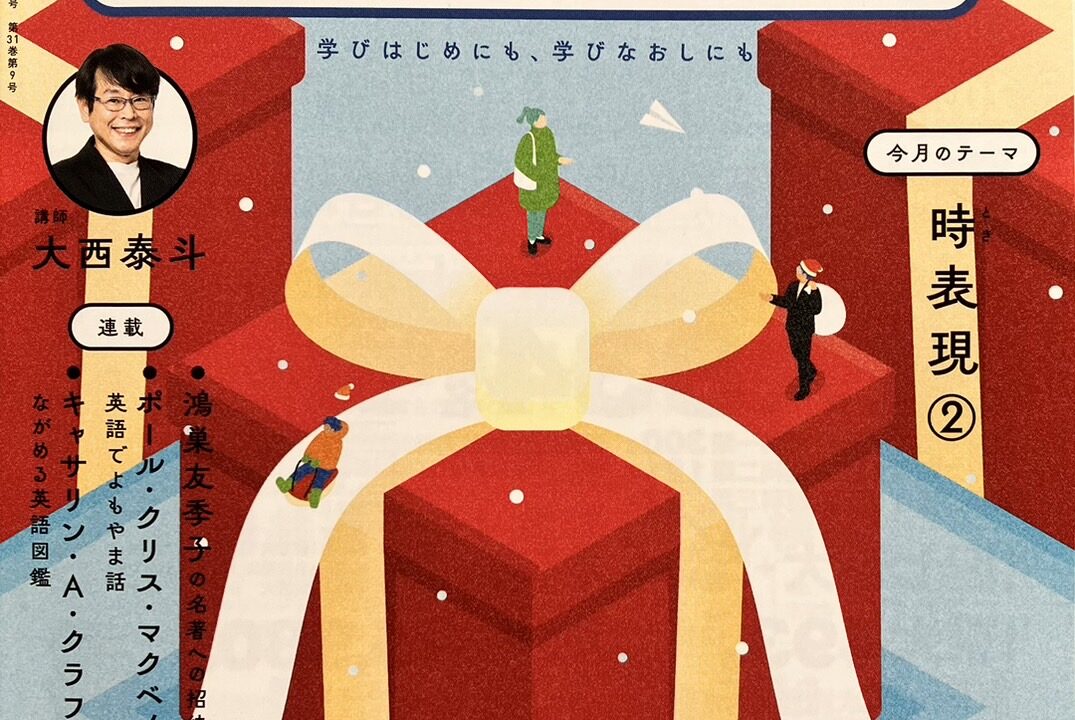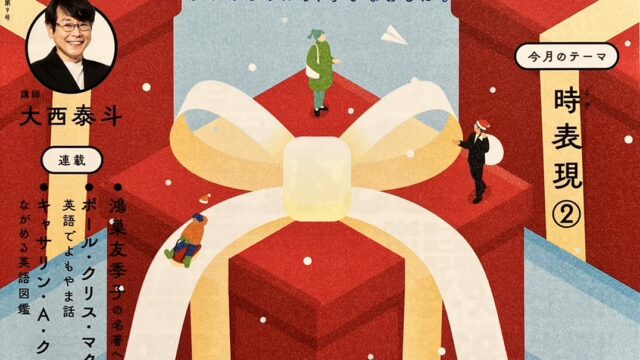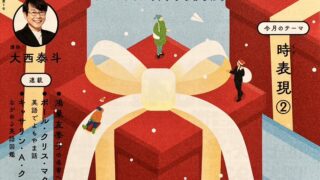【ラジオ英会話】Lesson 163 過去完了形 – December 4 Wednesday, 2024

December 4 Wednesday, 2024
Lesson 163 過去完了形
★Opening
D: Sensei, am I old-fashioned?
O: Yes, you are.
R: No, David! You are just a little old-fashioned.
D: Oh, just a little! In that case.
R: Okay. Maybe a lot.
☆Words & Phrases
**sell out:
She called very early, but the tickets had already sold out.
Oh, that’s too bad.
**suppose:
**through the internet:
**these days:
I suppose everybody buys tickets through the internet these days.
**app:
Yeah, all my friends use smartphone apps to do those kinds of things.
**old-fashioned:
**traditional:
We are a little old-fashioned, I guess. – No, you’re traditional.
☆Grammar and Vocabulary
I suppose everybody buys tickets through the internet these days.
リポート文
主語の思考・発言・知識などを「リポート」する文
作り方は動詞 (句) の後ろに節を並べるだけ。「説明ルール: 説明は後ろに置く」が生み出す形のひとつ
この文では、suppose(思う)の後ろに節を置き、その内容を説明している
ちなみに suppose は「実際はそうではないかもしれない」が感じられる単語
All my friends use smartphone apps to do those kinds of things.
「習慣」を表す現在形
現在形は「広く一般的な内容」を表す形
この文では「(ふだんから)使っています」と「習慣」を表している
時表現が理解できると、英文の意味がよりクリアにわかるようになる

☆Target Forms
She called very early, but the tickets had already sold out.
過去完了形(had+過去分詞)が使われている
現在完了形のイメージは「(今に)迫ってくる」
過去完了形は、基準となる時点が現在から過去に移り「過去のある時点までに(何かが起こった)」で、過去の時点からそれ以前の出来事をさかのぼって眺める意識
この文では、She called の時点「までに」チケットが売れてしまったことを表している
次の文はどうでしょう
I left home at 6 p.m. and arrived at the station at 6:30.
出来事が順序よく並べられたこの例では、arrived at the station の時点からさかのぼる意識はないため、left home に過去完了形は使われない
Practice
過去の時点からさかのぼって眺める意識が大切です。まず called の時点 に「ピン」を打ってください。ピンを起点にそれ以前に目をやりましょう。
had already sold out
↓
She called very early, but the tickets had already sold out.
① When we finally got home, the sun had already set.
→ 家に帰った時点に「ピン」を打ち、そこからさかのぼる
② He moved there because he had dreamed about it all his life.
→ movedに「ピン」。because 以下は、それ以前を振り返る内容
③ Why did Melissa go home? – Because she had finished her work already.
→ 過去の時点が文脈によって与えられている場合もある
★Practice
D: All right. It’s time for today’s practice. We’ll be using「過去完了形」. Phew! All right, there are two steps here. First, point in the past. And then, we say what happened before that. So remember, it’s all in the past. Got it? Let’s practice.
R: Repeat after us,
– had already set, had already set
– When we finally got home, the sun had already set.
D: Great work. Keep it up,
– had dreamed, had dreamed
– He moved there because he had dreamed about it all his life.
R:
– Why did Melissa go home?
D:
– Because she had finished her work already.
D: Unlock your potential.
R: Repetition is the key!
D&R: Great work.
☆Grammar in Action
①とても長い間あなたがいなかったので、心配していました。少なくともテキストメッセージを送ってください。
②彼は午後7時までいましたよ。ほかの人はみんなすでに帰ってしまっていました。
**until:
**everyone else:
③ Why did you pause the movie?(どうしてその映画を止めたの?)と聞かれて。
君が寝てしまっていたからだよ!
**fall asleep:
★Ending
O: Hey guys. I can get 50% discount at the movies. It’s good to get old.
D: Oh, you’re telling me. I can’t wait!
December 4 Wednesday, 2024
Lesson 163 過去完了形
(日本語訳・解説付き)
★Opening
D: Sensei, am I old-fashioned?
先生、僕って時代遅れですか?
O: Yes, you are.
うん、そうだね。
R: No, David! You are just a little old-fashioned.
違うよ、デイビッド!ちょっと時代遅れなだけだよ。
D: Oh, just a little! In that case.
ああ、ちょっとだけならいいや!そういうことなら。
R: Okay. Maybe a lot.
まあ…たぶん、結構時代遅れかもね。
☆Words & Phrases
**sell out: 売り切れる
She called very early, but the tickets had already sold out.
かなり早めに電話をしたんだが、チケットはもう売り切れだったそうだ。
Oh, that’s too bad.
まあ、それは残念だわ。
※That’s too bad. は「残念です」もしくは「お気の毒に」という表現です
**suppose: 思う
**through the internet: インターネットで
**these days: 近頃、最近
I suppose everybody buys tickets through the internet these days.
近頃は誰もがインターネットでチケットを買うんだろうね。
※suppose は「実際はそうではないかもしれない」が感じられる単語ですね!
**app: アプリ
Yeah, all my friends use smartphone apps to do those kinds of things.
ええ、私の友達はみんなスマホのアプリを使って、そういったことをしているわ。
※app は application の省略形です。smartphone app で「スマホアプリ」ですね!
**old-fashioned: 時代遅れの
**traditional: 昔からの、伝統的な
We are a little old-fashioned, I guess. – No, you’re traditional.
私らは、少し時代遅れなんだろうね – いいえ、おじいさんたちは昔かたぎなだけよ。
☆Grammar and Vocabulary
I suppose everybody buys tickets through the internet these days.
近頃は、誰もがインターネットでチケットを買うのだと、私は思います。
リポート文
主語の思考・発言・知識などを「リポート」する文
作り方は動詞 (句) の後ろに節を並べるだけ。「説明ルール: 説明は後ろに置く」が生み出す形のひとつ
この文では、suppose(思う)の後ろに節を置き、その内容を説明している
ちなみに suppose は「実際はそうではないかもしれない」が感じられる単語
All my friends use smartphone apps to do those kinds of things.
私の友達は皆、そういったことをするためにスマートフォンのアプリを使っています。
「習慣」を表す現在形
現在形は「広く一般的な内容」を表す形
この文では「(ふだんから)使っています」と「習慣」を表している
時表現が理解できると、英文の意味がよりクリアにわかるようになる

☆Target Forms
She called very early, but the tickets had already sold out.
彼女はとても早く電話をしましたが、チケットはもう売り切れていました。
過去完了形(had+過去分詞)が使われている
現在完了形のイメージは「(今に)迫ってくる」
過去完了形は、基準となる時点が現在から過去に移り「過去のある時点までに(何かが起こった)」で、過去の時点からそれ以前の出来事をさかのぼって眺める意識
この文では、She called の時点「までに」チケットが売れてしまったことを表している
次の文はどうでしょう
I left home at 6 p.m. and arrived at the station at 6:30.
私は午後6時に家を出て、6時30分に駅に着きました。
出来事が順序よく並べられたこの例では、arrived at the station の時点からさかのぼる意識はないため、left home に過去完了形は使われない
Practice
過去の時点からさかのぼって眺める意識が大切です。まず called の時点 に「ピン」を打ってください。ピンを起点にそれ以前に目をやりましょう。
had already sold out
↓
She called very early, but the tickets had already sold out.
① When we finally got home, the sun had already set.
私たちがようやく家に着いたときには、太陽はすでに沈んでいました。
→ 家に帰った時点に「ピン」を打ち、そこからさかのぼる
② He moved there because he had dreamed about it all his life.
彼は生涯を通じて憧れを抱いていたため、そこに移住しました。
→ movedに「ピン」。because 以下は、それ以前を振り返る内容
③ Why did Melissa go home? – Because she had finished her work already.
なぜメリッサは家に帰ったの?- もう仕事が終わったからだよ。
→ 過去の時点が文脈によって与えられている場合もある
★Practice
D: All right. It’s time for today’s practice. We’ll be using「過去完了形」. Phew! All right, there are two steps here. First, point in the past. And then, we say what happened before that. So remember, it’s all in the past. Got it? Let’s practice.
R: Repeat after us,
– had already set, had already set
– When we finally got home, the sun had already set.
D: Great work. Keep it up,
– had dreamed, had dreamed
– He moved there because he had dreamed about it all his life.
R:
– Why did Melissa go home?
D:
– Because she had finished her work already.
D: Unlock your potential.
R: Repetition is the key!
D&R: Great work.
☆Grammar in Action
①とても長い間あなたがいなかったので、心配していました。少なくともテキストメッセージを送ってください。
I was worried because you had been gone for so long. At least send me a text message.
②彼は午後7時までいましたよ。ほかの人はみんなすでに帰ってしまっていました。
He stayed until 7 p.m. Everyone else had already left.
**until: ~まで
※同じ状態がその時点まで続くことを意味する表現
**everyone else: 他の人みんな
③ Why did you pause the movie?(どうしてその映画を止めたの?)と聞かれて。
君が寝てしまっていたからだよ!
Because you had fallen asleep!
**fall asleep: 眠りに落ちる、眠り込む、眠りにつく
★Ending
O: Hey guys. I can get 50% discount at the movies. It’s good to get old.
ねえみんな。映画で50%の割引が受けられるんだよ。年を取るといいこともあるね。
D: Oh, you’re telling me. I can’t wait!
ほんとだよね。僕も早くその日が来ないかな!
名古屋駅前【AI×英会話】名古屋BEGビジネス英会話ジム – AIで鍛えるビジネスで使える英語力。仕事も日常も、一歩先へ。
営業時間:平日 9:00~21:00 土曜日 9:00~19:00(日祝休み)
〒450-0002 愛知県名古屋市中村区名駅2丁目40-16 名駅野村ビル 5階



